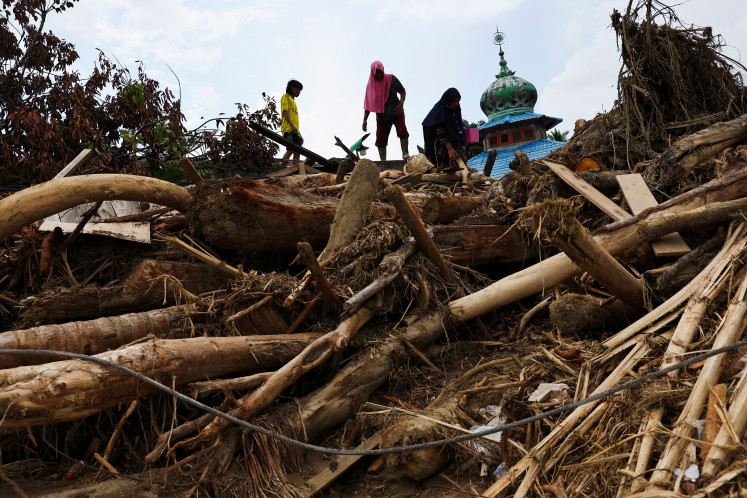Popular Reads
Top Results
Can't find what you're looking for?
View all search resultsPopular Reads
Top Results
Can't find what you're looking for?
View all search resultsLocal communities key to saving forests
Indonesia has the third largest area of tropical rainforest on the planet, with 68 percent of its landmass covered by forests and has 50 percent of the worldâs tropical peatlands, which are rich in carbon and key to fighting climate change
Change text size
Gift Premium Articles
to Anyone
I
ndonesia has the third largest area of tropical rainforest on the planet, with 68 percent of its landmass covered by forests and has 50 percent of the world's tropical peatlands, which are rich in carbon and key to fighting climate change.
These forests are also home to tens of millions of Indonesians. Forest-dependent communities have relied on forests for their livelihoods and their culture, developing age-old management practices that carefully protect the forests for the benefit of not just their community but all Indonesians. Forests are vast storehouses of plants and animals, feed the nation's rivers and help regulate the climate. They are a core part of Indonesia's identity.
Yet since 1900, Indonesia has lost half its forests and despite promises of reform is still losing between 1 and 2 million hectares a year. From 2000 to 2012, more than 15 million hectares were converted to industrial plantations. Oil palm, timber and pulp and paper production are among the biggest drivers of this dramatic deforestation, which has made Indonesia one of the world's top greenhouse gases polluters through land clearing, draining peat lands and annual forest fires.
Globally, about 13 million hectares of the world's forests lost each year, or roughly twice the size of the Republic of Ireland and in some nations, particularly in the tropics, deforestation is accelerating.
Much is made of the economic benefits of big agricultural firms. Far less is spoken about the devastating impacts on the daily lives, cultures and economies of the indigenous peoples and local communities who have been evicted in countless land grabs, some of them deadly.
Last month, indigenous communities from around the tropics met in Central Kalimantan and signed the landmark Palangkaraya Declaration on Drivers of Deforestation and the Rights of Forest Peoples to highlight the plight of forest-dependent communities.
The declaration urges governments, companies, banks, international agencies and others to halt the production and use of commodities from deforestation, land grabs and other violations of the rights of forest peoples. It also urges halting the invasion of forest peoples' lands and forests by agribusiness, mining companies and big infrastructure projects.
For many Indonesians living in large cities, forests seem a world away. Yet more than 110 million people live in rural areas, comprising nearly half of the nation's total population. As many as 95 million people are directly forest-dependent, of which an estimated 30 million to 70 million are indigenous peoples.
According to a 2013 report, President Susilo Bambang Yudhoyono's office said they had heard of 8,495 agrarian conflicts in 2012 alone, of which 2,002 were likely be violent and over half were in the palm oil sector. Conflicts have also led to the forced and violent eviction of communities without respect for their free, prior and informed consent, harassment and fatal shootings.
Global efforts to address deforestation through market mechanisms are failing, including those promoted by the UN Framework Convention on Climate Change (UNFCCC), the UN Collaborative Program on Reducing Emissions from Deforestation and Forest Degradation (UN REDD) and the World Bank. These efforts have also failed to respect indigenous and forest peoples' internationally recognized human rights.
As a result, land conflicts are proliferating.
The threat to many communities of actual extinction is no exaggeration: glaring malnutrition, water pollution and diseases resulting from loss of access to forests and hunting and gathering of forest products and game are having notable impacts on health and infant mortality rates in the province of Merauke, Papua, site of the government-endorsed 2 million hectare Merauke Integrated Food and Energy Estate, ironically launched by the Indonesian government in response to the food crisis of 2008.
So why should we care about the people who live in our forests? In an era of global interconnectedness and interdependence, the consumption choices we make every day directly affect the livelihoods, security and wellbeing of tens of millions of people in Indonesia and more than 1.6 billion people across the globe.
The forests have for centuries been managed, preserved and protected by the indigenous peoples and local communities who have acted as custodians. By depriving them of their rights, lands and livelihoods, it is the very survival of these people that is at risk, and along with this a wealth of knowledge, cultures, traditions, beliefs and diversity.
Compelling evidence from across the globe shows that when forest peoples' rights are secured and customary management and use of the forest supported, then deforestation can be halted and even reversed. The solution to deforestation lies with those who know the forests best and thus a change in policy to put rights and justice at the center of deforestation efforts at the national and international levels is critical.
The Palangkaraya Declaration calls on international financial institutions to strengthen environmental safeguards to prohibit direct and indirect financing of conversion or degradation of critical natural habitats and high conservation value areas. And developed countries, notably the European Union, and other traders must halt the trade in products from deforestation and land grabs.
The private sector must also establish credible mechanisms to verify compliance with certification standards and their new 'no deforestation, no exploitation' policies and to address complaints in the case of non-compliance.
Recent pledges by Asia Pulp and Paper, Golden Agri-Resources, Wilmar International and Asia Pacific Resources International Limited (APRIL) and buyers such as PepsiCo, General Mills and Colgate-Palmolive to reform the way they do business are encouraging. But these will only be effective when there is independent verification and credible procedures to hold such pledges to account.
While half the world's forests might already have disappeared, forest peoples are very much still here and their voices can no longer be ignored. The Declaration epitomizes a struggle for justice that will continue to grow.
_____________
The writer is project officer of Forest Peoples Program.










